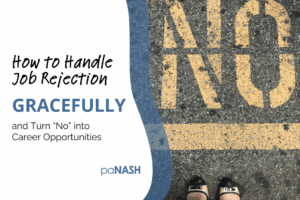|
|
In recent news, many workers are getting laid off from large companies headquartered here in Nashville, and also from government jobs in Washington, DC and around the country. Losing a job can feel like a punch in the gut, whether you saw it coming or not. It can be a huge blow to your career, your finances, and your confidence.
The good news is, just because you’ve lost your job, you haven’t lost your ability to work. This is not the end of your career story. In fact, it can be the start of an exciting new chapter in your career. Here’s how to recover quickly and land your next opportunity faster.
How to quickly recover from getting laid off
1. Take a moment to process
It’s natural for a layoff to cause a lot of negative emotions for you, including shock, anger, and even grief. But getting laid off can even cause some positive emotions, such as relief.
Whatever emotions you’re experiencing from the news of your layoff, it’s important to give yourself permission to feel them and to take time to process those emotions.
Taking the time to do so before jumping right into another job search will help you better manage those emotions. You’ll be able to compose yourself any time they start to bubble up again, even if in the middle of a job interview, so you don’t allow your feelings to sabotage your next opportunity.
2. Take advantage of your benefits and review your finances
Because getting laid layoff can come as a shock, you may not be thinking clearly when presented with your severance package. Try your best to review your severance package in full before signing it.
See if the package includes outplacement counseling, which is a fancy term for covering the cost of a career coach for you to help you find your next job. If it doesn’t, ask for it prior to signing, because it never hurts to ask! If your package does include outplacement counseling, take advantage of it! It can help you bounce back quicker, both emotionally and financially.
Also, check for any other benefits you’re entitled to, and check for payout of any unused vacation time. This money could come in handy when in between jobs.
Finally, file for unemployment if you qualify, and create a budget to manage expenses while you’re in between jobs. A little bit of financial stability will give you the breathing room you need to focus on your job search or start your own business.
3. Refresh your resume and LinkedIn profile
Yes, you will need to update your resume and LinkedIn profile, especially if you haven’t done so since your last job search (even though I recommend updating them every six months whether you’re looking for a job or not).
These refreshes and updates are necessary when applying to jobs online. But don’t rely only on submitting your resume to online job boards and search engines. Doing so can extend your job search even longer than the average length, which is three to nine months.
Only applying to jobs online is a sure recipe for more frustration, disappointment, and grief.
4. Spend more time networking instead
If I’ve said it once, I’ve said it a thousand times: since 80% of the workforce found their current jobs through networking, then you should spend 80% of your job search networking and only 20% submitting job applications. Most people have this reversed, and are working harder at applying instead of smarter with networking.
When it comes to networking within the same industry you previously worked in, I recommend you stay current with your professional association memberships, and see what jobs they have listed on the association’s web site and email blasts. Also, attend industry events and panels, or better yet, serve as a volunteer at these events.
If you want to change industries, network by conducting informational interviews with people already working in your prospective industry. Ask for the names of other people you should also do informational interviews with, and for any upcoming professional development events within the industry you can attend.
5. Upskill and stay marketable
These days, employers are less interested in your educational background, and are more interested in the skills you possess. This includes new skills you may not currently have, but can easily upskill to by getting a certification or completing a boot camp.
These opportunities for upskilling don’t require as huge an amount of time or money as going back to school does. It’s an affordable way to stay relevant and marketable. Plus, employers appreciate candidates who invest in continuous learning.
6. Stay positive and persistent
Rejection is part of the job search process, but don’t let it shake your confidence. Keep refining your approach, learning from feedback, and staying focused on your goal.
The right opportunity will come along.
Conclusion
Getting laid off is tough, but it doesn’t define you. With a proactive mindset, strategic networking, and continuous learning, you can bounce back stronger and land your next job sooner than later. Stay focused, stay connected, and most importantly, believe in yourself—you’ve got this!
If you need help, let me know.
Related posts
- 6 Ways to Handle a Layoff During a Rocky Economy
- How to Save Precious Time in Your Job Search by Recognizing Red Flags
- How to Successfully Compete in the 2025 Job Market
- 5 Ways to Manage Your Energy During Your Job Search
- 7 Ways You Can Stay Motivated During a Prolonged Job Search
- How to Re-Direct Your Career in a Time of Uncertainty





